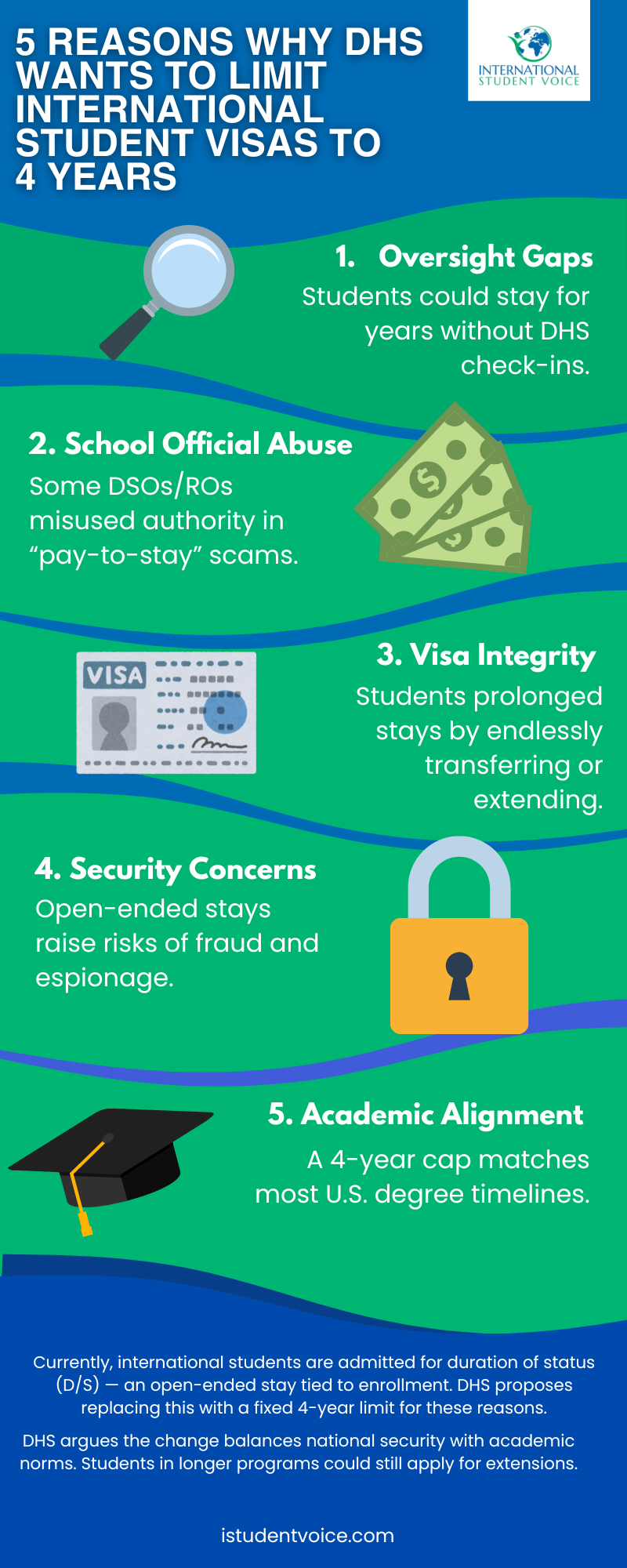DHS Proposes 4-Year Limit on International Student Visas
- Carrie Circosta

- Sep 3, 2025
- 2 min read

For decades, international students in the U.S. have been admitted under a system called “duration of status” (D/S). This meant your stay was tied to your program enrollment, not a fixed date on the calendar. As long as you stayed enrolled full-time and followed the rules, your legal status was valid.
Now, the Department of Homeland Security (DHS) wants to change that. A new proposed rule would replace D/S with a fixed 4-year admission period for most F-1 and J-1 students.
I want to emphasize: this is a proposed change. It is NOT official...yet. You can learn more about the process here.
So, we're in the public comment phase. We can see what DHS is proposing and provide our feedback.
Public comments are open until September 29, 2025 — so let’s break down what DHS is suggesting and why it matters.
What is Duration of Status (D/S)?
Under the current system, when you receive an F-1 or J-1 visa, you’re admitted for as long as your academic program lasts. This flexibility works well because degree timelines vary — some students finish in two years, while others may be here for seven years or more in a PhD or medical program.
The system also gave Designated School Officials (DSOs) at universities significant responsibility for maintaining records and ensuring students stayed compliant.
What DHS is Proposing
4-Year Admission Limit: Most students would receive a 4-year admission period.
2-Year Admission Limit: Students from countries with high visa overstay rates or considered national security concerns could be admitted for only 2 years at a time.
Extensions: Students in longer programs (PhDs, medical residencies, etc.) could apply for extensions, but these would require DHS approval.
Alignment with Academics: DHS says the 4-year timeline reflects the typical U.S. bachelor’s degree length, while also covering most master’s programs.
Why DHS Wants This Change
DHS argues that the current D/S system creates loopholes and risks. Their main justifications include:
Oversight Gaps: Students can stay in the U.S. for many years without routine DHS check-ins.
School Official Abuse: Some DSOs and Responsible Officers have been involved in “pay-to-stay” fraud schemes, falsely keeping students in status in exchange for money.
Visa Integrity: Students sometimes use transfers or repeated extensions to stay indefinitely, raising doubts about whether they are truly temporary visitors.
Security Concerns: DHS believes open-ended stays increase risks of fraud, espionage, and other security threats.
Academic Alignment: A fixed 4-year cap matches the standard U.S. degree timeline and, according to DHS, won’t burden most students.

What This Means for International Students
If finalized, this rule could:
Put more pressure on students to complete degrees within fixed timelines.
Require extra paperwork for those in longer programs.
Limit the authority of DSOs, shifting more decisions to DHS.
affects students from certain countries more than others, with only 2-year admission limits.
How to Share Your Voice
DHS is accepting public comments on this proposed rule until September 29, 2025.
Your feedback matters. Students, educators, and institutions can all weigh in on how this change could affect international education and U.S. competitiveness.



Comments